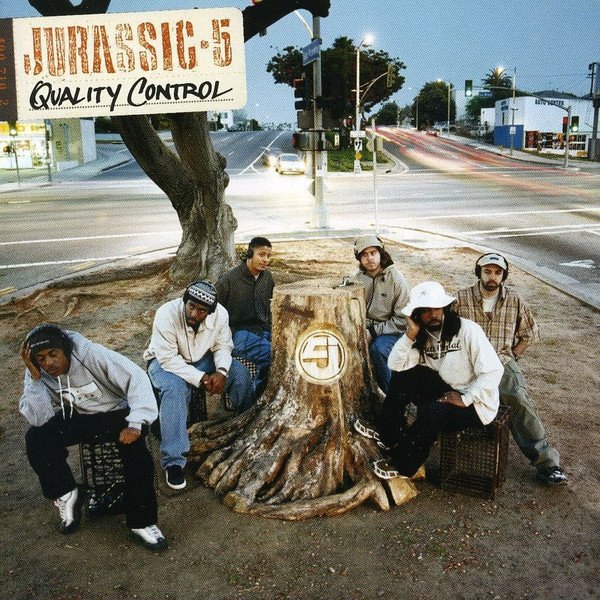Happy 20th Anniversary to Jurassic 5’s third studio album Power In Numbers, originally released October 8, 2002.
As a hip-hop head, experiencing mainstream rap music during the early to mid ‘’00s could be depressing. The superstars of the day frequently centered their material on acquiring material wealth, but mostly lacked the personality to make their music even remotely interesting. Which pretty much made this era the doldrums of the genre.
But every once in a while, a group like Jurassic 5 would drop an album like Power In Numbers through a major label to keep things interesting.
Jurassic 5 came to Power In Numbers, released 20 years ago, as “six men and a venomous independent decision and clear vision,” ready to lead through example. Hip-Hop heads are notoriously fractious and can be difficult to motivate, but the group is unwavering in its commitment to move the genre towards a more positive place. The group’s line-up was comprised of emcees Charles “Chali 2na” Stewart, Dante “Akil” Givens, Courtenay “Zaakir” Henderson aka “Soup,” and Marc “Marc 7even” Stuart, as well as two DJs/producers Lucas “Cut Chemist” MacFadden and Mark “DJ Nu-Mark” Potsic. By the time the album hit the shelves, the group was at the peak of their powers.
Power In Numbers was Jurassic 5’s third project, coming after their self-titled EP (1997) and Quality Control (2000), their first full-length. It’s also their best release, as the members of J5 improved in all areas of their execution. The lyricists’ writing abilities had improved, and they all sound more fluid, both when kicking traditional 16-bar verses and when working and in-tandem, hot-potatoing the mic from emcee to emcee. Though they’re all still adept at rhyming about their own skills, they also do well when they branch out with the subject matter.
On production, Cut Chemist and Nu-Mark split their duties more or less evenly, with the latter taking a slightly heavier load. They were still among the best crate diggers working in the early ’00s, unearthing some of the best rare soul and jazz grooves to grace albums from the early ’00s. For Power In Numbers, they spread their wings a bit behind the boards. While previously opting for more aggressive fare, they vary their production stylings here.
Power’s opening track, the soulful and relatively placid “Freedom,” demonstrates this new approach, as Nu-Mark chops and slows down the guitar and vocals from “This Feeling,” by Julius Brockington. The four emcees follow suit, exploring the shifting meaning of what it means to be “free” in the early 21st century, remarking how the United States nominally places a lot of value in the word, but rarely follows through on its promise.
J5 do some exceptional conceptual work throughout Power In Numbers, finding unique ways to create narrative. On “Remember His Name,” the crew recount on a group phone call how they’ve been surrounded and stalked by death all of their lives. Here, the grim reaper takes the form of a vaguely remembered background character who always seems to be present when trouble is afoot. “Thin Line” features the five “scribbl[ing] my thoughts on thin strips of emotion,” struggling with the difficulties that come with falling for close female friends.” Nelly Furtado contributes both vocals for the chorus and her own verse as well, sharing the woman’s equally complicated feelings.
However, Jurassic 5 also excelled at giving their listeners what they were best known for, which was old school influenced, beat and lyrics oriented hip-hop. “What’s Golden?,” Power’s first single, is the crew’s dedication to hip-hop’s Golden Era. Each emcee expounds on how hip-hop shaped their lives and added potency to their words. “The saga continues, this I won't get into,” Marc 7even raps. “’Cause there ain’t enough bars to hold the drama that we been through.”
“Break” is the most fun song on Powers. The track features one of the sickest beat drops on a hip-hop track in the last two decades, as Cut Chemist lays a monstrously funky guitar loop from Freddie North’s “Love To Hate” over a neck-breaking drum track. The beat is perfect for the emcees to “pay homage, as well as returning favors,” kicking old school routines and verses that hit with the force of an earthquake. “No aftershock, we blow the spot from the top,” Akil raps. “We have to rock, ain’t that much time on the clock.”
J5 clearly excel when the octane is cranked up on their tracks, and their strongest recordings on Power In Numbers hit that sweet spot. “A Day At The Races” is the group’s dedication to late 1980s/early 1990s “fast rap,” with all four members of the group executing verbal gymnastics at a high rate of difficulty over a sample from David Axelrod’s “Urizen.” The group is joined by East Coast legends Big Daddy Kane and Percee P, both of whom helped define the art of “fast rap.” The pair keep pace with their younger cohorts, sounding as spry as ever.
Songs like “After School Special” and “Sum Of Us” are other examples of J5 playing to their well-honed strengths. “High Fidelity” is another refreshing change of pace, as Marc 7even and Zaakir tag-team a bouncy Nu-Mark track. The song gives shine to two of the more underappreciated members of the group, who acquit themselves well.
J5 also brought in producers outside of the immediate camp. Some are familiar, like the LA-based Sa-Ra Creative Partners, who contributed a pair of tracks to Quality Control. On Numbers, they put together “Hey,” a song unlike anything that J5 featured on their previous projects. The five emcees harmonize and trade brief verses, as the delicate track shimmers like something that The Floaters would have recorded in the early 1970s.
Enjoying this article? Click/tap on the album covers to explore more about Jurassic 5:
The group also enlists JuJu of the Beatnuts to produce a pair of tracks. “One Of Them” doesn’t quite work as a whole. The crew rains scorn on fake gangstas, shady record executives, and self-absorbed “vain ass, plain ass, nothing ass n****s” over a gritty track. Though the beat would sound at home on a Beatnuts album, J5 steps a little bit too far out of their comfort zone, and the song narrowly misses its mark.
“If You Only Knew” is the stronger of the two JuJu productions. Musically, it’s the most back-to-basics entry on Power In Numbers, as JuJu hooks up a subtle flute loop, pairing it with strains of piano. The four emcees again trade brief verses, explaining their complex road to success, and re-stating their commitment to creating gimmick-free music. “No overnight success or running with vets,” Marc 7even raps. “Just pure unadulterated work progress .”
Power ends with a pair of declarations of purpose, one lyrical and another instrumental. “I Am Somebody” serves as the group’s call to arms against all oppressors, with the power of their music “unifying these ballers and backpacks with knowledge and fat tracks,” as Chali 2na proclaims. The instrumental collage “Acetate Prophets,” produced by both Cut Chemist and Nu-Mark closes the album. Whereas Quality Control closed with “Swing Set,” the pair’s deep dive into Swing music, here the two mine their vast collections of world music, repurposing rare tracks in a swirling sonic tornado.
Power In Numbers was J5’s pinnacle. The album was a critical success, but generally misunderstood by larger outlets. Like many of the more interesting offerings from major labels at the time, it didn’t find a lot of commercial success, but “What’s Golden” is one of the group’s most recognizable recordings. It still provided a look at the group operating at its full potential, firing on all cylinders, and seeking to inspire progress by paying homage to earlier times.
LISTEN:



